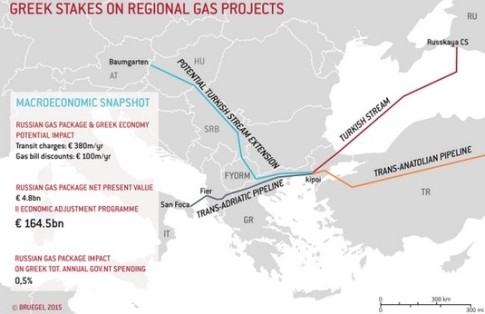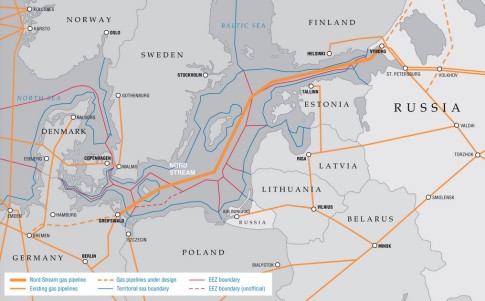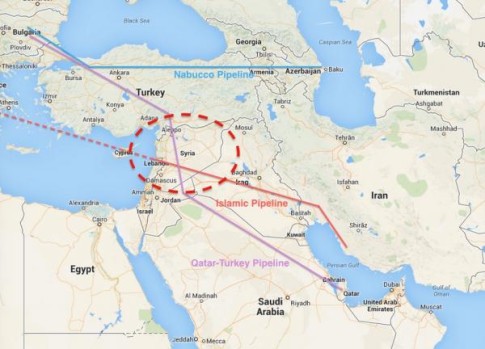Greece completes stage one of the dreaded “Russian pivot” as energy ministers from Athens and Moscow ink an MOU on Gazprom’s Turkish Stream pipeline. Meanwhile, Gazprom signs a deal with Shell and others to double the capacity of the Nord line, a move which will, over time, decrease the energy giant’s dependence on Ukraine for transport.
– Russia, Greece Ink Pipeline Deal As Gazprom Boosts Ukraine Bypass (ZeroHedge, June 18, 2015):
Two weeks ago, in “Greece Breaks America’s Heart, Will Sign MOU With Russia For Gas Pipeline,” we highlighted comments from Greek Energy Minister Panagiotis Lafazanis which indicated that Athens was prepared to sign an MOU with Russia on the Turkish Stream pipeline.
As a reminder, The Turkish Stream will allow Gazprom to bypass Bulgaria by piping gas through Turkey, then through Greece, Serbia, and Hungary straight to the Austrian central hub.
Washington urged Greece to spurn the Russians and support an alternative pipeline plan designed to let the EU tap into Caspian gas via a series of connecting pipelines running from Azerbaijan to Italy. The Greeks, seeing no need to view the two pipeline projects as competitors, indicated that they would be open to supporting both. “Greece is no one’s property,” Lafazanis said, adding that Athens would “move based on its national interests.”
As is becoming more apparent by the day, the country’s “national interests” are clearly not aligned with the rest of Europe and to the extent Gazprom would be willing to advance Greece a portion of the projected revenues from its portion of the pipeline, Athens interests very clearly align with Moscow’s which is why no one should be surprised that Greek energy officials indicated Thursday that the MOU was a done deal. WSJ has more:
Greece is expecting to sign a preliminary agreement for the country’s participation in Russia’s planned extension of a gas pipeline through Greek territory, Greek energy ministry officials said Thursday..
The potential Greek-Russian agreement, which wouldn’t be legally binding, is expected to be signed Friday during Greek Prime Minister Alexis Tsipras’ visit to an economic conference in St. Petersburg.
Mr. Tsipras is due to meet Russian President Vladimir Putin Friday on the sidelines of the forum.
The agreement on the so-called ’Turkish Stream’ gas pipeline, which would bring Russian gas to Europe through Greece and Turkey, is expected to be signed by the Russian and Greek Energy Ministers, the Greek officials said.
But the Turkish Stream MOU with Greece wasn’t the only preliminary energy deal Gazprom inked on Thursday. The company also signed a memorandum of intent with Shell, E.On and OMV to double the capacity of the Nord Stream pipeline — the shortest route from Russian gas fields to Europe — to 110bcm/year. The Nord Stream
Here’s WSJ again:
State-controlled Gazprom said it had signed a memorandum of understanding with Royal Dutch Shell, Germany’s E. ON and Austria’s OMV AG to add two lines to the Nord Stream pipeline, opened in 2011 as part of a Russian strategy to circumvent transit countries such as Ukraine.
Gazprom said the additional pipelines in the Baltic would double Nord Stream’s current capacity of 55 billion cubic meters a year. Gazprom accounts for one-third of the European Union’s imports, around half of which is transported through Ukraine.
Gazprom said the companies would form a joint venture for the project. The creation of additional transport infrastructure along the shortest route connecting gas fields in northern Russia and markets in Europe will facilitate an increase in the security and reliability of deliveries under new contracts, said Gazprom Chief Executive Alexei Miller.
(Nord Stream line)
It appears Russia is making progress in efforts to facilitate the unimpeded flow of gas to Europe even as the crisis in Ukraine has escalated recently in the face of conflicting reports about artillery fire and various other violations of the ceasefire struck four months ago in Minsk. Gazprom also faces anti-trust charges filed in April by the EU Commission.
Perphaps Moscow thinks now is a good time to beef up the capacity of existing supply routes considering the increasinly tenuous situation in Ukraine and given that events in the Middle East may eventually conspire to bring a new source of supply for the EU online…



The ongoing silence on this subject puzzles me. Of course Greece is going to do business with Russia, and help them get more products to the Euro markets….not just gas, but their other products as well.
Why are all media so silent on this subject? Greece needs the business, and Russia needs Greece………..